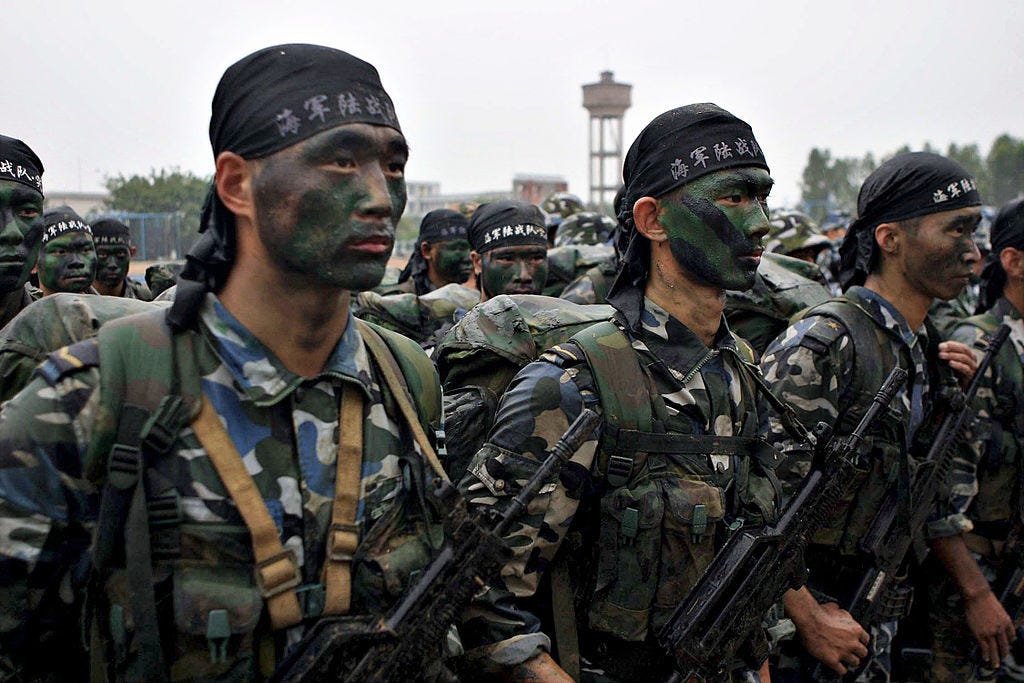China Looks to Expand its International Network of Bases and Dual-Use Infrastructure
The rise of China is a momentous force in 21st-century global politics, one increasingly accentuated by the nation’s growing military might. Despite Beijing’s public-facing promotion of a foreign policy doctrine of non-interference, China is becoming markedly more assertive abroad and is actively expanding its international security footprint.
China has consolidated greater control over its national peripheries and has aggressively pursued its territorial claims.
Further afield, Beijing looks to build out an international network of bases and dual-use infrastructure.
Over the past week alone, there have been reports about the construction of a “network of roads, buildings, and military outposts” located “deep in a sacred valley in Bhutan,” assertions of Chinese interest in establishing “a large naval port capable of hosting submarines or aircraft carriers on Africa’s western coast,” and articles detailing plans to upgrade an airstrip and bridge on the Central Pacific island nation of Kiribati, which is located midway between Asia and North America.
This information would seem to align with the U.S. Department of Defense’s 2020 China Military Power Report, which assessed:
“The PRC is very likely already considering and planning for additional overseas military logistics facilities to support naval, air, and ground forces. The PRC has likely considered locations for PLA military logistics facilities in Myanmar, Thailand, Singapore, Indonesia, Pakistan, Sri Lanka, United Arab Emirates, Kenya, Seychelles, Tanzania, Angola, and Tajikistan. The PRC and Cambodia have publicly denied having signed an agreement to provide the PLAN with access to Cambodia’s Ream Naval Base.”
In addition to these claims, there are more tangible indications of China’s ambition to grow its power projection capabilities and better secure its foreign interests.
Beijing has declared much of the South China Sea as its sovereign territory and has staked, developed, and built island structures throughout, equipping them with the infrastructure necessary to host and service its naval assets. By some estimates, China’s Nine-Dash Line encompasses approximately 90 percent of the identified maritime domain, including the Paracel and Spratly Islands.
In 2017, China formally established its first overseas military base in Djibouti on the Horn of Africa’s littoral and has since upgraded the site to include a pier capable of supporting aircraft carriers.
(Opening Cerememony of China’s Military Base in Djibouti)
China’s efforts to build a blue-water navy, secure sea lines of communication, and protect vital shipping routes and supply chains have fuelled speculation about plans for additional maritime bases abroad. One long-rumoured location is Pakistan’s Gwadar Port on the Arabian Sea, commonly referred to as the crown jewel of the China–Pakistan Economic Corridor (CPEC).
In Central Asia, Beijing has stationed forces in Tajikistan’s Gorno-Badakhshan province, a borderland straddling Afghanistan and Xinjiang. In 2016, Reuters reported on Chinese plans to finance and build 11 outposts and a training facility for border personnel, while the Wall Street Journal detailed bilateral security agreements signed in 2015 or 2016 that “gave Beijing rights to refurbish or build up to 30 to 40 guard posts on the Tajik side of the country’s border with Afghanistan.” There have also been reports of Chinese interest in establishing a military presence in Afghanistan’s Wakhan Corridor as a buffer against potential violent spillover.
China’s Belt and Road Initiative (BRI) is a long-term global-scale economic and infrastructure program that includes an expanding security dimension.
The Mercator Institute for China Studies (MERICS) explains, “In view of China’s ballooning investments and growing Chinese expat communities in risk-prone countries, Beijing has become convinced that it has to take security concerns along the BRI routes in its own hands.” MERICS situates China’s recent law approving counter-terrorism operations abroad as well as its overseas base in Djibouti within this greater context. They also note how a “new industry of Chinese private security companies is rapidly developing, providing protection to BRI projects.”
If China continues to rise and its foreign interests continue to grow, it is likely to further expand its international security presence. China aspires to superpower status, and this, by its very definition, requires the ability to exert influence and project power across the globe.





